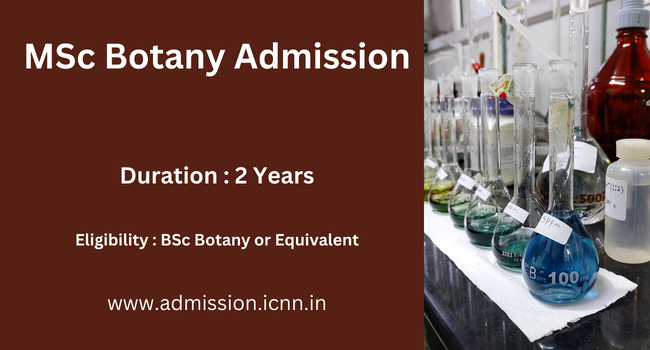MSc Botany Admission 2024: MSc Botany is a 2-year postgraduate program in the field of plant biology and its applied aspects. In this program, candidates will learn about Plants, Physiology, Genetics, Microbiology, Biotechnology, Cell Biology, and Ecology. Graduates who have completed BSc in Botany or other plant science subjects can apply for this course. The admission is through entrance tests and/or merit-based performance. The average fee lies between INR 41,000 to INR 85,000 PA.
On completion, students can find jobs as botanists, horticulturists, plant breeding experts, researchers in pharma firms, nurseries, agricultural institutes, and more. Leading universities have opened 2024 admission for the MSc Botany program.
MSc Botany Admission Updates
- University of Delhi, Delhi, presents an MSc Botany program. Eligibility: Bachelor’s degree in Botany/Biology with 55% marks. Fees: ₹20,000 per year. Deadline: May 7, 2024. Visit http://www.du.ac.in/.
- IMTS Institute, Noida, provides an MSc Botany program. Eligibility: Bachelor’s degree in Botany/Biology with 50% marks. Fees: ₹1,00,000 per year. Deadline: May 15, 2024. Visit https://www.imtsinstitute.com/.
- Banaras Hindu University (BHU), Varanasi, offers an MSc Botany program. Eligibility: Bachelor’s degree in Botany/Biology with 55% marks. Fees: ₹30,000 per year. Deadline: May 20, 2024. Visit https://www.bhu.ac.in/.
- William Carey University, Shillong, offers an MSc Botany program. Eligibility: Bachelor’s degree in Botany/Biology with 50% marks. Fees: ₹60,000 per year. Deadline: May 25, 2024. Visit https://www.wmcarey.edu/wcu-meghalaya/.
Entrance Exam: The University of Delhi conducts the Delhi University Entrance Test (DUET) for admission to the MSc Botany program.
MSc Botany Admission 2024 Highlights
| Full Form | Master of Science in Botany |
| About the Course | M.Sc in Botany is a postgraduate program with a focus on plant biology. |
| Duration | 2 years |
| Eligibility | BSc Botany with a minimum of 50% marks |
| Examinations | GATE, TS PGECET, and CUET |
| Fee | INR 41,000 to INR 85,000 PA |
| Approval | UGC |
| Job Opportunities | Teacher and professor, Medical Coder, Data Analyst, Incident Manager, Corporate Communications Manager, etc. |
| Admission Process | Entrance exams and merit-based admissions |
| Subjects | Mainstream biology, genetics, biotechnology, plant physiology, cell biology, microbiology, ecology, etc. |
| Distance Education | Available |
| Admission Date | May 2024 |
| University | NILM University, William Carey University, IMTS Institute |
| Entrance Exam | May 2024 |
| Placement | Cadila Healthcare, Cipla, Reliance Life Sciences |
For admission, candidates have to qualify for entrance exams such as GATE, TS PGECET, and CUCET or equivalent. UG degree (BSc Botany or BTech) in the relevant stream is required to apply for the MSc Botany Course at the online portal.
Delivering high-quality courses with significant vocational components and professional skill development integrated throughout the curriculum is the primary goal of the Master of Science in Botany program. Numerous job opportunities exist for students enrolled in the M.Sc. in Botany course in the food and processing, oil and chemical industries, plant health inspection services, nurseries, etc.
Applicants can enroll for the MSc Botany two-year program at numerous universities like Amity University, Panjab University, LPU, DAV University, CMJ University, etc. The complete course fee of the Botany program is INR 41,000 to INR 85,000 PA, and the registration fee for the MSc Botany Program is around INR 250 to INR 15,00, it also varies for the different universities.
Eligibility Criteria for MSc Botany
The MSc Botany admission process is open for candidates who have secured the minimum eligibility as shown below.
- Candidates must pass an entrance test and complete a course leading to any bachelor’s degree in biology with any subject, with a minimum total score of 50%, to be admitted to the M.Sc. in Botany degree in India.
- BSc degree in Biological Sciences/Life Sciences candidates can also apply to the MSc Botany program.
- There is no set age restriction or entry requirements for this MSc course.
Top MSc Specializations
MSc Botany Admission 2024
Students can pursue this course at numerous universities such as Amity University, Nalanda University, Central University of Kerala, and many others. The basic eligibility criteria for admission to the MSc Botany course is a bachelor’s degree with at least 50% marks from any authorized university.
MSc Botany Admission program fee is accepted through payment modes like cards, mobile internet banking, or demand draft. MSc Botany Admission is proposed after the merit list is determined upon the entrance test and UG degree scores.
MSc Botany Entrance Exam 2024
Numerous students apply for MSc Botany admission every year in serval universities/ colleges. The producer of admission is different in each college. Some universities take admission on a merit-based, some universities take direct admission, and some invite admission on a first come, first get policy. On the other hand, some top universities take admission on an entrance base. Candidates must face entrance exams like AUCET, PUCAT, CUCET, SVUCET, JET, BHU PGET, etc.
MSc Botany Admission: Top Universities in India
Yashwantrao Chavan Maharashtra Open University:
It provides MSc Botany to learn about Plant Physiology, Plant Ecology, Plant Taxonomy, and Plant Microbiology.
Eligibility: BSc in Botany from a recognized university.
Admission deadline: April 2024 to May 2024.
Career options are research scientist, botanist, ecologist, and plant biotechnologist.
Rashtrasant Tukadoji Maharaj Nagpur University:
It offers this 2-year course to learn Medicinal Plants, Plant Biotechnology, Conservation Biology, and Urban Ecology.
Eligibility: BSc in any related discipline.
Admission deadline: April 2024 to May 2024.
Jobs are found are conservation biologist, ecologist, horticulturist, and plant pathologist.
Shoolini University:
The MSc Botany course at Shoolini University is focused on Plant Pathology, Plant Anatomy, Plant Morphology, and Conservation Biology.
Eligibility: Bachelor’s degree in a related field.
Admission deadline: April 2024 to May 2024.
Careers include botanist, ecologist, conservation biologist, and plant pathologist.
Punjab University:
PU offers an MSc Botany course to teach about Plant Biochemistry, Plant Microbiology, Plant Ecology, and Urban Ecology.
Eligibility: BSc in a relevant subject of study.
Admission deadline: May 2024 to June 2024.
Jobs are environmental consultant, botany professor, biological science technician, etc.
Lovely Professional University:
The MSc Botany course offered by LPU is focused on Plant Taxonomy and systematics, Plant Genomics and genetics, Conservation Biology, and Mycology.
Eligibility: BSc with 50% score.
Admission deadline: April 2024 to April 2024.
Career include assistant scientist, plant biotechnologist, and botanist.
This course is offered at the master’s level to provide advanced knowledge and skills to students related to the science of plants.
MSc Botany Admission Process 2024
There are two ways to apply for MSc Botany admissions in India on campus or online. Students can apply online or offline for course admission. Some universities offer MSc Botany admission through entrance exams or direct admission. Follow the steps below to apply for MSc Botany admission.
- Visit the colleges or universities where you are interested in applying for MSc Botany program
- On the university’s website, candidates must fill out an application form.
- Applicants must fill out the application form completely and accurately.
- The application form and fee should be submitted to the college or university.
- By debit/credit card or by BHIM UPI, students can pay the application fee online.
- Upon successful payment of the fees, the candidate will receive an email and SMS confirmation.
- Students must take a printout after successfully submitting the application.
MSC Botany Syllabus
The duration of the MSC botany program is two years and four semesters. Here below are the semester-wise syllabus details for MSC botany programs.
| Semester 1 | Semester 2 |
| Microbiology |
Paleobotany and Palynology
|
| Bryophytes, Pteridophytes, and Gymnosperms |
Taxonomy of Angiosperms
|
| Phycology |
Mycology and Plant Pathology
|
| Cell Biology and Biomolecules |
Genetics and Genomics
|
| Plant Anatomy and Developmental Biology | – |
| Semester 3 | Semester 4 |
| Microbial Biotechnology |
Computer Applications and Bioinformatics
|
| Plant Physiology and Pharmacognosy | – |
| Plant Molecular Biotechnology and Biology | – |
| Plant Physiology and Biochemistry | – |
MSc Botany Subjects
MSc Botany course is set up in a way that gives students a deep understanding of every subject so they can focus on different parts of their knowledge. There are core subjects, elective subjects, and practicals in the course. It includes theoretical classes, lab work, hands-on training, and workshops. The course curriculum covers a wide range of subjects, such as microbes, plants, genetics, and cells. Some of the most important subjects of the MSc Botany course are:
- Biochemistry
- Bioinformatics
- Cell Biology
- Genetics and Genomics
- Microbiology
- Phycology
- Plant Physiology
Top Colleges For MSc Botany Admission 2024
Multiple Universities are offering this MSc Botany course through online portals. Admissions will be based on Entrance Exam (CUET, LPUNEST, OJEE, MUET, etc) and merit score. Some of the Top universities listed are mentioned below the section.
- Nalanda University
- Indira Gandhi National Open University
- Shri Lal Bahadur Shastri National Sanskrit University
- Shri Lal Bahadur Shastri National Sanskrit University
- Central University of Kerala
- Sindhu Central University
- Central Tribal University of Andhra Pradesh
- Rajiv Gandhi University
- Tezpur University
- Central University of South Bihar
- Mahatma Gandhi Central University
What after MSc Botany?
Students after completing MSc in Botany, students are eligible to work in the public and government sectors. Weed Scientists, Ethnobiology, Plant Ecology, Plant Taxonomy, Plant Scientists, Palynology, Pathology, and many other career roles are available. Students have also the option to learn more about the Botany field and can pursue a Ph.D. in Botany or MPhil.
Scope of MSc in Botany
MSc Botany Master’s degree program is ideal for every individual who is eager for an in-depth study of the structures, features, and characteristics of plant life. The amount of knowledge, the student acquires during the course helps them to find suitable professional options in the employment sectors like:
- Biological Supply House
- Animal and Plant Health Inspection
- Land and Conservation Management
- Nature Conservancy
MSc in Botany Salary & Jobs
Students can get good Job opportunities after MSc course according to their knowledge and skills. The average salary package of Botany-based professionals is between INR 2,80,000 PA and INR 11,00,000 PA. Some Ideal job positions are below the section.
- plant explorer
- conservationist
- ecologist
- environmental consultant
- horticulturist
- plant biochemist
- nursery manager
- molecular biologist
- taxonomist
- environmental consultant and agricultural consultant
Some Other Courses





